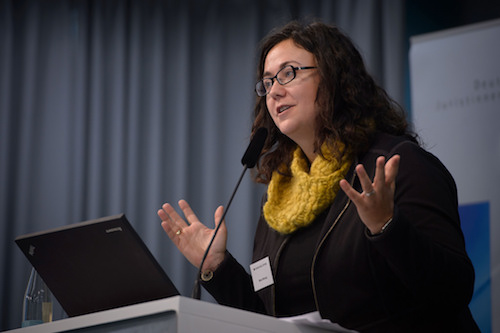(Editor’s note: This was originally posted on Exberliner as “The Price of Sex.” It’s reposted here with the permission of the author.)
BY MARY KATHARINE TRAMONTANA
While the rest of the world sees Berlin as a paragon of sexual freedom, the women who live here know it’s not that simple – not for them at least, as German health insurance doesn’t cover birth control. Why does sex without pregnancy have to come at such a high price?
 It’s undeniable that society has progressed when it comes to female sexuality. Science has rediscovered the internal clitoris. Slut-shaming is now frowned upon. Feminist porn is a thing. But when it comes to the laws on sexuality, there’s some serious progress to be made.
It’s undeniable that society has progressed when it comes to female sexuality. Science has rediscovered the internal clitoris. Slut-shaming is now frowned upon. Feminist porn is a thing. But when it comes to the laws on sexuality, there’s some serious progress to be made.
Case in point: in Germany – even in liberated Berlin – women literally have to pay for their sexual freedom. Yes, even though 69 percent of German women of reproductive age use contraception, neither public nor private health insurance covers any method of birth control for women over 20 unless it is prescribed for medical reasons, like acne.
This means that in Berlin, depending on the brand and package size, women have to pay €50-266 per year for the pill; €180-195 plus extra insertion fees for a hormonal implant (good for three years), or up to €400 for an IUD, which lasts five to 10 years and is up to 20 times more effective than the pill or condoms. Emergency contraception, aka the “morning after pill,” costs up to €35 for one dose.
Some European countries provide at least partial reimbursement for these methods. In Spain, for example, women usually pay 40 percent of the cost of contraception and the remaining 60 percent is paid for by health insurance. In France, insurance covers 65 percent of the cost. In the UK, the National Health Service makes most types of birth control free for everyone (including men), regardless of age or income. Even in the US, with its still-troubled health insurance system, over half the states require plans to cover all contraception methods, while Planned Parenthood provides birth control for the uninsured on a sliding scale.
For many expat women, the expense of preventing pregnancy in Berlin came as an unhappy surprise. “It’s been the bane of my life since I moved here,” says Claire*, a journalist from New Zealand who relocated to Berlin in 2011. “I remember the first time I went to buy condoms at Edeka and was horrified at how expensive they were. And then, when I finally went to buy my pill, that was another kick in the gut.”
At New Zealand family planning clinics, 144 condoms or a six-month supply of the pill costs around €3. A copper IUD, hormonal injection and emergency contraception are free.
Kelly*, an English teacher from Northern Ireland who came to Berlin in August, says she doesn’t understand why the €250 she pays for health insurance each month as a freelancer doesn’t cover the cost of her birth control pills. “I’m disgusted at the amount of money that comes out of my account every month for my Krankenkasse, and then I have to go and pay on top? It’s like a tax on being responsible.”
After getting her first prescription from the gynecologist for a six-month supply of the pill for €50, she had to wait until payday to buy it.
And she was one of the lucky ones: a six-month supply is the most cost-effective prescription size available, but according to ProFamilia, Germany’s leading non-governmental family planning center, many German gynecologists will only write prescriptions for three months at a time, forcing women to pay a higher price and return to the doctor’s four times a year.
Some expat women end up bringing it from home. A literature student from Greece says that each time she’s back in Athens, she stocks up on emergency contraception, where it costs as little as around €5 from the chemist. A visual artist from the U.S. says that she had to wait until she went back to visit family to get her IUD, where it was paid for by her health insurance
__________
Strangely, when it comes to contraception, public policies in Germany seem to have moved backward. East Germany made birth control pills available and free to all female citizens of the GDR, and until 2004, Germany’s social welfare automatically covered the cost of contraceptives for people with low income. Now, people receiving Hartz-IV benefits can only get their birth control covered by submitting a doctor’s prescription and a written request to their Job Center consultant.
Uniquely for Germany, Berlin has five sexual health and family planning centers, located around the city, that provide free contraceptives and STI/HIV testing for Amt-registered people with proof of need, such as four weeks of bank statements or social assistance documentation.
But the people who might benefit from these centers rarely know they exist.
Psychologist Ines Scheibe, head of pregnancy conflict counseling at the Humanist Association of Berlin-Brandenburg, says, “Many, many women come to us pregnant and they say, ‘I had to pay for my flat, food, and after everything else, I didn’t have enough left.’ And when I tell them it’s free [for them], they say, ‘I didn’t know.’” Many doctors aren’t telling their patients about the option of free contraception because they don’t bother with time-consuming (unpaid) conversation, especially on ‘frivolous’ topics like sexuality.
Others don’t want to lose patients, or they just aren’t aware themselves.
__________
So why is something that’s needed by all women who have sex with men, and vice versa, not covered at all by private insurance and only covered by public insurance until the age of 20? Christine Göpner-Reinecke, a spokesperson from the public health insurance fund AOK, says that technically, there’s no law against the Krankenkasse covering contraception. “The health insurance itself decides what extra services we offer.” But because they are not legally required to cover birth control, they don’t do so.
For their part, Germany’s Ministry of Health says that “public health funds are for the treatment of the ill” and “conception is not considered to be an irregular state in a healthy woman’s life.” So pregnancy prevention isn’t covered because pregnancy isn’t an illness – but meanwhile, public insurance shells out lavishly for every aspect of childbirth, including specialized yoga and acupuncture for soon-to-be mums and three-week parental burnout therapies at the seaside. In fact, there’s theoretically a huge economic incentive to make contraception free and easily accessible.
About half of all pregnancies are unintended. For a birth with no complications, the Krankenkasse has to pay €2600 – more than if a woman were to use contraception during her entire reproductive lifetime. But of course, aging Germany might prefer to pay for babies rather than the joy of stress-free sex.
“The reason why contraception is not covered by public insurance funds in Germany is historically based on a strong pro-natalist policy by the conservatives and Christians in the CDU and CSU,” explains historian Heiko Stoff, a professor at the Institute for History, Ethics, and Philosophy of Medicine at the College of Medicine in Hannover.
Pharmaceutical historian Bettina Wahrig, from Humboldt University, blames politics as well. “Politicians are worried about low birth rates. There are still prevailing beliefs that middle-and upper-class families produce fewer offspring than lower-class families. So they shouldn’t be helped with birth control…”
Another motivation could be that Germany’s pharmaceutical industry – the largest in Europe – might benefit from women paying out-of-pocket. Individuals can’t influence the price of drugs and medical devices, whereas when it comes to reimbursement, the government does have price-setting power. If contraceptives became the responsibility of public insurance funds, couldn’t the drug companies be forced to lower their prices?
“That makes sense,” pharmacologist Gerd Glaeske says. “In Germany, it’s the association of statutory health insurance funds which is involved in the price negotiations. But the state could, of course, influence the price.”
It’s true that if contraceptives like Bayer’s market leaders Yaz, Loestrin or Natazia were subsidized, more people might buy birth control. But surely Big Pharma has done its homework: if enough women are willing to pay the current price (€60-200 for six months), they see no benefit in change.
“A lot of people profit from this system,” says Jutta Pliefke, a gynecologist from ProFamilia. And ultimately, she says, it all perpetuates gender discrimination. “Right now, a woman has to take numerous steps in order to control her fertility, and some can’t make all of these .”
Some argue that couples can share the cost of contraception, but this idea lacks a realistic perspective. Any Berliner could attest to the fact that people, often, don’t have a steady partner. Should these women ask their date for a financial contribution before they have sex?
And let’s not ignore the risks and side effects that come with any contraception. From severe depression to weight gain to low libido, women pay not only with their wallets but with their bodies and minds as well. The least the state could do is chip in.
And when it comes to abortion laws, Germany frankly doesn’t make it much easier.
Maria Wersig, a lawyer, and professor from Dortmund who directs the “Social Security Law, Family Balancing” commission of the German Women Lawyers’ Association, points out:
If women get pregnant in Germany, they have a legal responsibility to give birth. There’s the possibility of abortion within the first 12 weeks if she talks with a social worker – the state says, ‘It’s wrong to have an abortion, but we accept it in this circumstance.’ That’s a big difference from being legal.
Indeed, abortion is still in Germany’s penal code and, like contraception, women must pay for it out of their pockets. The law’s message to women is clear, Wersig says. “If you don’t want to get pregnant, don’t have sex.
In 2012, Scheibe helped to found the Bündnis für sexuelle Selbstbestimmung (Alliance for sexual self-determination) after noticing that the women she was counseling were increasingly insecure about their reproductive choices.
A pro-choice coalition is a broad group of counseling services, health providers, NGOs, political parties, union representatives and activists fighting for unrestricted right to abortion and “information about and access to contraception that is covered by medical insurance”. Last year, ProFamilia, a member of the coalition, ran a campaign to gain back free contraception for all low-income men and women in Germany, but they were unsuccessful.
Scheibe believes that progress is not likely to happen anytime soon for her two granddaughters. Despite the chancellery being occupied by a woman, “There’s a conservative climate in Germany. Such new ideas aren’t acceptable,” she diagnoses. Really?
Mary Katharine Tramontana is a Berlin-based freelance journalist. She trained as a sex research assistant at the Kinsey Institute for Research in Sex, Gender, and Reproduction.
Her work has appeared in The Guardian, The Atlantic’s CityLab, Bitch magazine, Vice, i-D, The New Inquiry, and Dazed, among others. You can follow her on Twitter at:https://twitter.com/BangingBerlin or read more at: marykatharinetramontana.contently.com.
Email: mktramontana@gmail.com




















